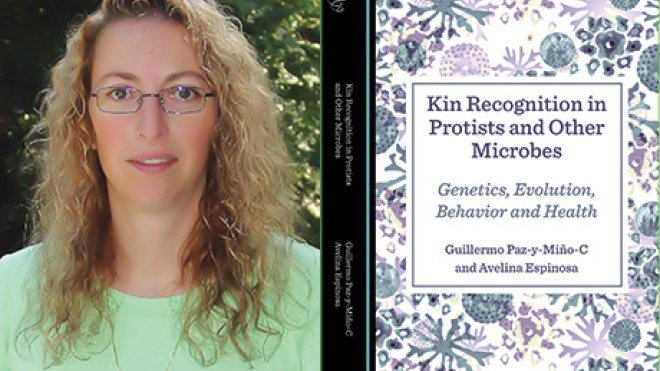RWU Microbiologist Publishes Book on Cell-to-Cell Communication
Avelina Espinosa co-authors work on kin discrimination and recognition in unicellular organisms

BRISTOL, R.I. – We think of birds communicating to form migratory flyways over expansive distances. Or the eerie songs of blue whales, which have been turned into popular relaxation music. But when it comes down to single-cell organisms that aren’t animals or plants, who would guess that even these microscopic creatures communicate and collaborate with each other?
A new book written by Avelina Espinosa, a molecular microbiologist at Roger Williams University, and Guillermo Paz-y-Miño-C, an evolutionary biologist and co-director of New England Science Public, shines a light on this little-known aspect of cell-to-cell communication in unicellular organisms like protists and microbes.
Kin Recognition in Protists and Other Microbes explores the genetics, evolution and behavior of cells capable of discriminating and recognizing its close relatives from non-relatives or cells from different species, the ability to learn and adapt to be able to recognize kin and similar cell lines, and how unicellular kin cooperation may help further our understanding of the origins of multicellular organisms. It also examines the role that kinship and similar cell lines play in the organisms’ ability to cause disease, such as dysentery or malaria.
“Single-cell organisms exchange signals to aggregate with highly related organisms,” Espinosa said. “The ability to communicate is beneficial because it helps unicells access resources in the wild or infest hosts when they are pathogenic. Clear examples are amoebas and bacteria like E. coli.”
Published by Cambridge Scholars Publishing, the book contains more than 200 figures and diagrams to illustrate the scientists’ comprehensive analysis of the microbial world.
According to Virginia P. Edgcomb, associate scientist at Woods Hole Oceanographic Institution, “Paz-y-Miño-C and Espinosa have produced a real gem! Anyone interested in the evolution of life on Earth from any perspective would find this a great read. The authors beautifully synthesize, for the first time, the historical literature on taxa-, clone-, and kin-discrimination/recognition in unicellular eukaryotes (protists) and other microbes. They place what is known about the genetics, behavioral and chemical aspects of kin recognition into a balanced evolutionary perspective. The carefully-chosen case studies, definitions of terms, and summaries provided in each chapter result in a book that is accessible to a wide range of readers; a valuable resource for experts in the field, as well as students and interested non-experts looking for a stimulating and very thought-provoking volume.”